
You wouldn’t hand over your bank card to a complete stranger on your doorstep — or would you?
Imposter scams are becoming increasingly sophisticated and it may be easier to fall victim than you might realize. Scott Merkovitch was one such victim who lost $20,000 after he got a call on May 16 from what he thought was his bank.
Don’t miss
- I’m 49 years old and have nothing saved for retirement — what should I do? Don’t panic. Here are 6 of the easiest ways you can catch up (and fast)
- Want an extra $1,300,000 when you retire? Dave Ramsey says this 7-step plan ‘works every single time’ to kill debt, get rich in America — and that ‘anyone’ can do it
- Robert Kiyosaki warns of a ‘Greater Depression’ coming to the US — with millions of Americans going poor. But he says these 2 ‘easy-money’ assets will bring in ‘great wealth’. How to get in now
“They told me that there was fraud alerts on my account on a couple of charges that they didn’t feel like were mine,” he told Fox 26 Houston in a story published July 1.
The caller was also able to tell Merkovitch about valid transactions in his account “which, again, is what gave me the kind of assurance that I was talking to a real person,” he said.
Merkovitch was told a security representative from Wells Fargo would soon show up at his home.
Here’s what happened
Footage captured by Merovitch’s football camera and shared with the broadcaster appears to show a woman walking up to his front door. Merovitch says she identified herself and gave him a code that the caller had shared with him.
Believing her to be a legitimate employee from Wells Fargo, Merovitch says he gave her his card. She then cut it in half with a pair of scissors, sealed the pieces in an envelope and drove off.
An hour and a half later, over $20,000 had been withdrawn from Merovitch’s account from ATMs a few miles from home, he says.
Merovitch filed a police report, per Fox 26, and a few days after the incident he received a notice from Wells Fargo — this one was legitimate.
“They basically accused me of transferring the money into the accounts and then authorizing the charges,” he said. He thinks blaming him “is just the easy way out for a gigantic organization.”
Wells Fargo told Fox 26 the bank would take another look at Merovitch’s case.
Read more: You don’t have to be a millionaire to gain access to this $1B private real estate fund. In fact, you can get started with as little as $10 — here’s how
Fraud losses on the rise
The broadcaster reports Merovitch’s case is similar to another pair of Wells Fargo customers who fell victim to a similar scheme earlier this year.
Imposter scams can involve the transfer of cash and even gold bars, and initial contact with victims comes in many forms, such as messages claiming to be from federal agents or phone calls from seemingly legitimate authority figures.
As scams become increasingly elaborate, more Americans are becoming victims of fraud. In 2024, consumers reported losing more than $12.5 billion to fraud — a 25% increase over 2023 — according to the Federal Trade Commission (FTC).
In total, 2.6 million consumers filed fraud reports in 2024, according to the FTC, with 38% of those victims saying they lost money because of it. Imposter scams were the most reported category, followed by online shopping, job, investment and Internet services scams.
How to protect yourself
If you’ve never heard of the scam Merovitch fell victim to, it’s not surprising because “scammers’ tactics are constantly evolving,” Christopher Mufarrige, director of the FTC’s Bureau of Consumer Protection, said in a news release.
So, what can you do about it, especially as scams are changing?
Wells Fargo told Fox 26 that it would never ask you to hand over or mail your physical card or PIN to prevent fraud. The FTC adds you should never send money, cryptocurrency or gold in response to an unexpected call or message. Don’t believe anyone who urges you to quickly move your money for protection.
Never click on links or call phone numbers in unexpected messages — those can lead you directly to scammers. Even if your phone’s caller ID shows you’re getting a call from the bank, remember that scammers can spoof legitimate phone numbers. Instead, contact the organization yourself — a staffer should be able to verify if the institute needs to contact you.
Being defrauded can be financially painful — and you may not have any recourse once the money has disappeared from your account. The same advice holds true today as it always has: never hand over cash (or your credit card, gold bars or anything of value) to a stranger in your doorway.
What to read next
- Financial aid only funds about 27% of US college expenses — but savvy parents are using this 3-minute move to cover 100% of those costs
- Here are the 6 levels of wealth for retirement-age Americans — are you near the top or bottom of the pyramid?
- Here are 5 ‘must have’ items that Americans (almost) always overpay for — and very quickly regret. How many are hurting you?
- How much cash do you plan to keep on hand after you retire? Here are 3 of the biggest reasons you’ll need a substantial stash of savings in retirement
Money doesn’t have to be complicated — sign up for the free Moneywise newsletter for actionable finance tips and news you can use. Join now.
This article provides information only and should not be construed as advice. It is provided without warranty of any kind.